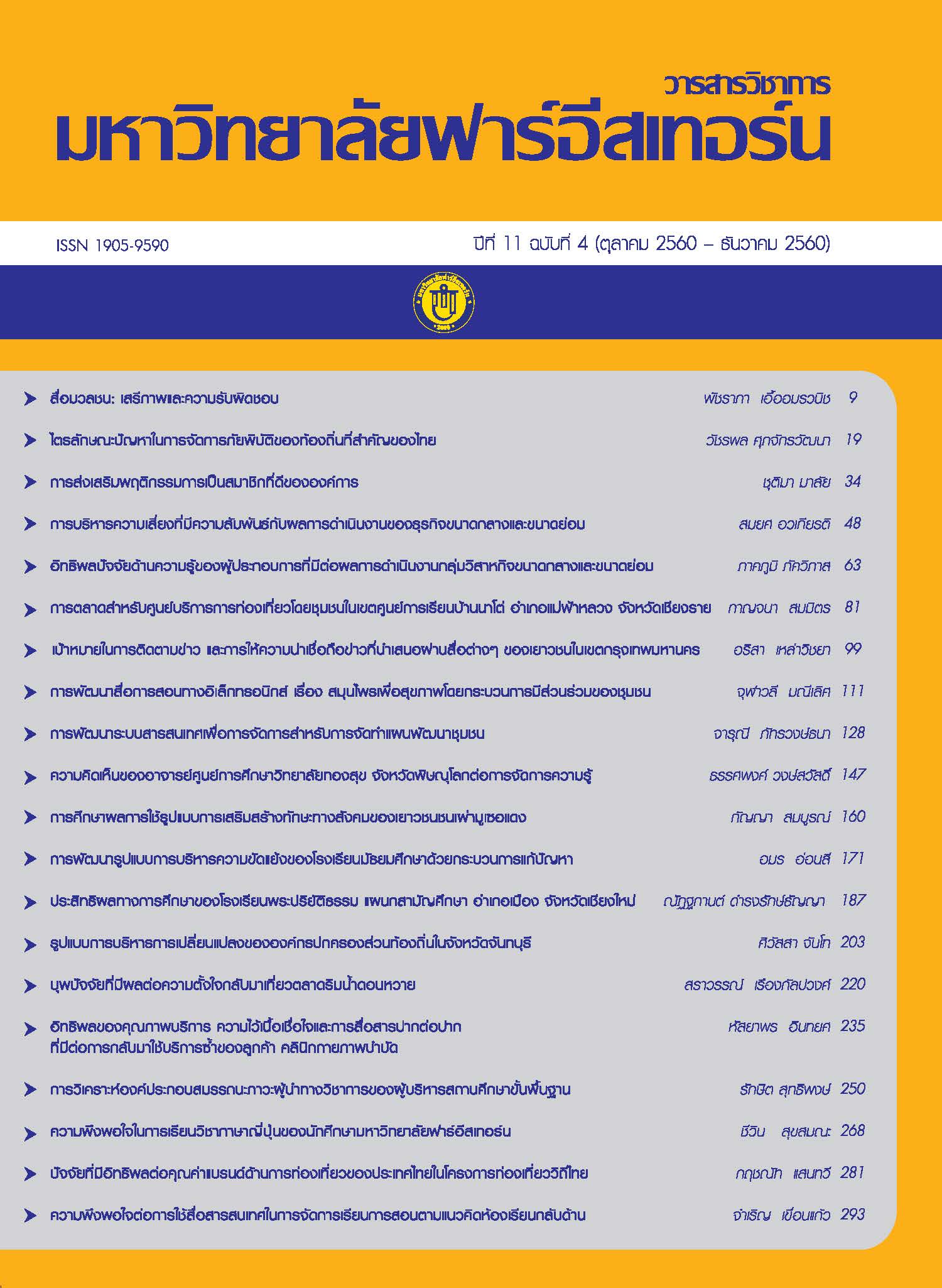การส่งเสริมพฤติกรรมการเป็นสมาชิกที่ดีขององค์การ: ความท้าทายในการบริหารเพื่อพัฒนาคุณภาพอาจารย์พยาบาล
Main Article Content
Abstract
ปัจจุบันการจัดการศึกษาระดับอุดมศึกษาต้องเผชิญกับการเปลี่ยนแปลงที่ส่งผลต่อการบริหาร
การศึกษา ผู้บริหารต้องปรับตัวเพื่อสร้างคุณภาพของผลผลิตและองค์การ และหากลยุทธ์ที่ทำให้องค์กร
อยู่รอดได้วิทยาลัยพยาบาลเป็นสถาบันอุดมศึกษา ได้รับผลกระทบจากสภาพการเปลี่ยนแปลงดังกล่าว
รวมทั้งมีข้อจำกัดปัจจัยพื้นฐานที่สำคัญคือ การขาดแคลนอาจารย์ซึ่งเป็นทรัพยากรที่มีค่าในการขับเคลื่อน
การพัฒนา ทำให้อาจารย์ต้องพัฒนาบทบาทภาระหน้าที่และปรับเปลี่ยนวิธีการทำงานให้มีประสิทธิภาพ
จึงเป็นความท้าทายของผู้บริหารที่ต้องเร่งพัฒนาและส่งเสริมอาจารย์ให้ได้แสดงศักยภาพการทำงาน
อย่างเต็มที่ ช่วยให้สามารถปรับตัวในการปฏิบัติงานทั้งในบทบาทและนอกเหนือบทบาทอย่างเต็มศักยภาพ
เพอื่ นำไปสูก่ ารทำงานทมี่ ปี ระสิทธิผล บทความนผี้ เู้ ขียนจึงเสนอแนวคิดการสง่ เสริมพฤติกรรมการทำงานของ
อาจารย์พยาบาลให้มีคุณภาพสูง โดยส่งเสริมให้แสดงพฤติกรรมการให้ความช่วยเหลือ (Alturism) ความสำนึก
ในหน้าที่ (Conscientiousness) ความอดทนอดกลั้น (Sportsmanship) การคำนึงถึงผู้อื่น (Courtesy) และ
การให้ความร่วมมือ (Civic Virtue) ซึ่งพฤติกรรมนี้ เรียกว่า “พฤติกรรมการเป็นสมาชิกที่ดีต่อองค์การ”
เป็นพฤติกรรมที่บุคคลเต็มใจปฏิบัติงานอย่างเต็มที่เกินกว่าบทบาทที่ตนรับผิดชอบ นำไปสู่การเพิ่ม
ประสิทธิภาพและประสิทธิผลขององค์การอย่างดี
Nursing educational institutions have faced to changes in economy, politics, society and
increased competition in education. This influenced in educational administration to be qualified
nursing educational institutions. The institutions had to adapt to promote quality of products and
institutions, strategies for maintaining organizations among competition and changes were needed.
Furthermore, there were limitations in main factors, lack of nursing instructor, key resource in
driving development. Therefore, it was challenge for administrators to drive improving and promote
the nursing instructors to be competence, to be able to adjust performance related to roles and
others, and promote factors influencing good manners of the instructors as members of the
organization. This can encourages effective working within changing and competition situations.
The article presented concepts of promoting working behaviors to be qualified by encouraging
organizational citizenship behaviors, altruism, conscientiousness, sportsmanship, courtesy, and
civic virtue. This is, the nursing instructors would like to work more wider than those mentioned as
their roles. Consequently, there would be increased effectiveness and efficiencies of the organization.
Article Details
1. Any views and comments in the Journal of Social Innovation and Lifelong Learning are the authors’ views. The editorial staff have not to agree with those views and it is not considered as the editorial’s responsibility.
2. The responsibility of content and draft check of each article belongs to each author. In case, there is any lawsuit about copyright infringement. It is considered as the authors’ sole responsibility.
3. The article copyright belonging to the authors and The Far Eastern University are copyrighted legally. Republication must be received direct permission from the authors and The Far Eastern University in written form.
References
Bolon, Douglas S. (1997). Organizational Citizenship Behavior among hospital employees : A multidimensional analysis involving job satisfaction and organizational commitment. Hospital and Health Services Administration 42(2), 221-241.
ชุติมา มาลัย. (2552). ปัจจัยที่มีอิทธิพลต่อพฤติกรรมการเป็นสมาชิกที่ดีขององค์การของอาจารย์วิทยาลัย พยาบาล สังกัดกระทรวงสาธารณสุข. วิทยานิพนธ์ปริญญาปรัชญาดุษฎีบัณฑิต สาขาวิชาการ บริหารการศึกษา ภาควิชาการบริหารการศึกษา คณะครุศาสตร์ มหาวิทยาลัยศิลปากร, 2552.
Chutima Malai. (2009). Factors Influencing Organizational Citizenship Behaviors of Nursing Instructor in Colleges of Nursing Ministry of Public Health. Thesis Doctor of Philosophy Program in Educational Administration, Department of Educational Administration, Silapakorn University.
Conger, Jay A, and Kanungo, Rabindra N. (1988). The Empowerment Process: Integrating Theory and Practice. Academy Management Review 13(3), 471-475.
Eisenberger, Robert & Huntington, Robin. (1986). Perceived Organizational Support. Journal of Applied Psychology 71(3), 500.
Genesan, Shankar. (1994). Determinant of Long-Term Orientation in Buyer-Seller Relationships. Journal of Marketing 58, 1-19.
เนติยา แจ่มทิม. (2557). ตัวแปรที่มาก่อนความยึดมั่นผูกพันในงานและการเสริมสร้างพลังอํานาจที่ส่งผลต่อ ผลการปฏิบัติงานและพฤติกรรมการเป็นสมาชิกที่ดีขององค์การของอาจารย์พยาบาล วิทยาลัย พยาบาลบรมราชชนนี กระทรวงสาธารณสุข. วิทยานิพนธ์ปริญญาศึกษาศาสตร์ดุษฎีบัณฑิต สาขา การบริหารการศึกษา ภาควิชาการศึกษา คณะศึกษาศาสตร์ มหาวิทยาลัยเกษตรศาสตร์.
Netiya Jaemtim (2014).Antecedents of Engagement and Empowerment Impact on Job Performance and Organizational Citizenship Behaviors of Nursing Instructor in Colleges of Nursing Instructor of Boromarajonani Colleges of Nursing, the Ministry of Public Health. Thesis Doctor of Education Program in Educational Administration, Department of Education, Kasetsart University.
Organ, Dennis W. (1988). Organizational Citizenship Behavior : The Good Soldier Syndrome. Massachusetts : Lexinton.
Organ, Dennis W., Podsakoff, Philip M. & MacKenZie, Scott B. (2006). Organizational Citizenship Behavior: Its Nature, Antecedents, and Consequences. California : Sage Publications.
Organ, Dennis W. & Ryan, Katherine. (1995). A Meta-Analytic Review of Attitudinal and Dispositional Predictors of Organizational Citizenship Behavior. Personnel Psychology 48(4), 775-802.
Podsakoff, Philip M. & MacKenzie, Scott B. (1997). Impact of Organizational Citizenship Behavior on Organizational Performance : A Review and Suggest for Future Research. Human Performance. 10(2), 133-151.
สฎายุ ธีระวณิชตระกูล.(2547). การส่งเสริมพฤติกรรมการเป็นสมาชิกที่ดีต่อองค์การสู่การพัฒนา ทรัพยากรมนุษย์ในองค์การอย่างยั่งยืน. วารสารศึกษาศาสตร์. 16(1),15-18.
Sadayou Teeravanittakul (2004). The Promotion of Organizational Citizenship Behaviors for Human Resource Sustainable Development in Organization. Journal of Education Burapha University. 16(1),15-28.
Sheppard, Blair H., Lewicki, Roy J. & Minton, Jacob W. (1992). Organizational Justice (The Search for Fairness in the Workplace). United States : Macmillan, Inc.,.
Smith, Ann.C., Organ, Dennis W. & Near, Jabet P. (1983). Organizational Citizenship Behavior : Its Nature and Antecedents. Journal of Applied Psychology. 68(4), 653-663.
Wayne, Sandy J., & Green., Shawn A. (1993). The Effects of Leader-Member Exchange on Employee Citizenship and Impression Management Behavior. Human Relations. 43(12), 1431 – 1440.
Wright, C. W., & Sablynski, C. J. (2008). Procedural justice, mood, and prosocial personality influence on organizational citizenship behavior. Journal of Psychology. 10(2), 397-412.

